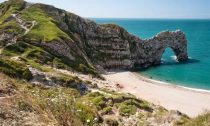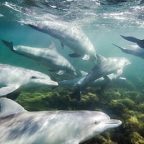
The Wildlife Trusts has welcomed the news that the Government is designating a third phase of 41 new Marine Conservation Zones (MCZs). This historic move will help protect the seas around our shores and follows on from previous announcements of 50 MCZs (in 2013 and 2016). It is the third of three phases promised by the Government in order to fulfil the remit of the Marine and Coastal Access Act.
The 41 new MCZs are special places and include cold water corals, forests of sea fans, rocky canyons and sandbanks – an astonishingly varied range of submerged landscapes which support the stunning diversity of marine life found in the UK. They include Bembridge MCZ, which is very unusual because it is home to both species of native seahorse, Solway Firth MCZ, whose sand banks are resting places for seals, and Holderness Offshore MCZ, which is important for its crabs and lobster. All will contribute towards a network of areas which is urgently needed to ensure a healthy future for our seas.
Joan Edwards, Director of Living Seas at The Wildlife Trusts, says: “It’s fantastic news that now we have 91 Marine Conservation Zones – they will form a vital series of underwater habitats which can be nursed back to health. The Wildlife Trusts have been calling for the government to give real protection to a network of diverse sea-bed landscapes since 2009 and over 22,000 people joined our call for better protection of our seas during last summer’s consultation. Huge thanks to everyone who has supported this change! Now we need to see good management of these special places to stop damaging activities such as beam-trawling or dredging for scallops and langoustines which harm fragile marine wildlife.”
After the first 50 MCZs were designated, The Wildlife Trusts launched a Wave of Support campaign to coincide with the public consultation on the third phase. Over 22,000 people joined the call for better protection of our seas in just six weeks in the summer of 2018. The Wildlife Trusts believe that the new total of 91 MCZs are a great step forward – but now the focus must be on caring for these special places effectively so that our ocean wildlife has the best possible chance of recovery.













Social Profiles